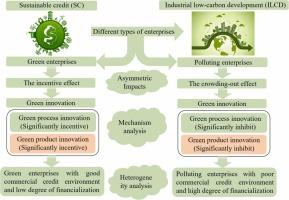可持续信贷对工业低碳发展的不对称影响:来自中国的证据
IF 6.9
2区 经济学
Q1 BUSINESS, FINANCE
Research in International Business and Finance
Pub Date : 2025-08-01
DOI:10.1016/j.ribaf.2025.103131
引用次数: 0
摘要
本文以2007 - 2021年中国a股上市工业企业为样本,采用双向固定效应模型,考察了可持续信贷对工业低碳发展的非对称影响。基线结果表明,SC对绿色企业的ILCD具有显著的激励效应,而对污染企业的ILCD具有显著的挤出效应。机制分析表明,供应链对绿色企业的绿色产品创新和绿色过程创新具有显著的激励作用。而供应链对污染企业绿色工艺创新和绿色产品创新的抑制作用显著。异质性分析表明,激励效应主要体现在商业信贷环境好、金融化程度低的绿色企业,挤出效应主要体现在商业信贷环境差、金融化程度高的污染企业。本文为提高供应链管理水平,促进不同类型企业的自主创新提供了新的理论和实证依据。本文章由计算机程序翻译,如有差异,请以英文原文为准。

Asymmetric impacts of sustainable credit on industrial low-carbon development: Evidence from China
Using Chinese A-share listed industrial enterprises from 2007 to 2021, this paper examines the asymmetric impacts of sustainable credit (SC) on industrial low-carbon development (ILCD) by adopting two-way fixed effects model. The baseline result indicates that SC has the significant incentive effect on ILCD of green enterprises, while it has the significant crowding-out effect on ILCD of polluting enterprises. Mechanism analysis shows that SC significantly incentives green product innovation and green process innovation of green enterprises. However, SC significantly inhibits green process innovation and green product innovation of polluting enterprises. Heterogeneity analysis shows that the incentive effect is reflected in green enterprises with good commercial credit environment and low degree of financialization, while the crowding-out effect is reflected in polluting enterprises with poor commercial credit environment and high degree of financialization. This paper provides new theoretical and empirical evidences for improving SC and promoting ILCD of different types of enterprises.
求助全文
通过发布文献求助,成功后即可免费获取论文全文。
去求助
来源期刊

Research in International Business and Finance
BUSINESS, FINANCE-
CiteScore
11.20
自引率
9.20%
发文量
240
期刊介绍:
Research in International Business and Finance (RIBAF) seeks to consolidate its position as a premier scholarly vehicle of academic finance. The Journal publishes high quality, insightful, well-written papers that explore current and new issues in international finance. Papers that foster dialogue, innovation, and intellectual risk-taking in financial studies; as well as shed light on the interaction between finance and broader societal concerns are particularly appreciated. The Journal welcomes submissions that seek to expand the boundaries of academic finance and otherwise challenge the discipline. Papers studying finance using a variety of methodologies; as well as interdisciplinary studies will be considered for publication. Papers that examine topical issues using extensive international data sets are welcome. Single-country studies can also be considered for publication provided that they develop novel methodological and theoretical approaches or fall within the Journal''s priority themes. It is especially important that single-country studies communicate to the reader why the particular chosen country is especially relevant to the issue being investigated. [...] The scope of topics that are most interesting to RIBAF readers include the following: -Financial markets and institutions -Financial practices and sustainability -The impact of national culture on finance -The impact of formal and informal institutions on finance -Privatizations, public financing, and nonprofit issues in finance -Interdisciplinary financial studies -Finance and international development -International financial crises and regulation -Financialization studies -International financial integration and architecture -Behavioral aspects in finance -Consumer finance -Methodologies and conceptualization issues related to finance
 求助内容:
求助内容: 应助结果提醒方式:
应助结果提醒方式:


